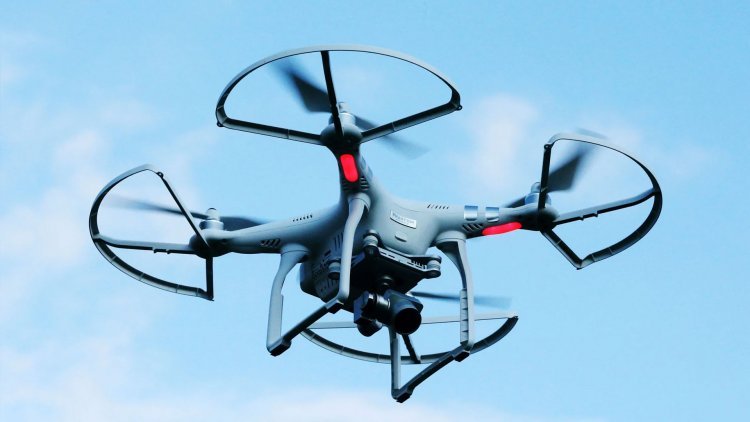Drone industry thrives in 2022, with requests for government assistance to be maintained in 2023.
The industry demands government aid in building manufacturing industries for drone components such as batteries for 2023, an increase in subsidies and spending of production-linked incentives, the implementation of a service-linked incentive programme, and so on.

In 2022, the drone industry had reason to celebrate. The embryonic business has received backing from the government, industry, and related industries, with Finance Minister Nirmala Sitharaman creating Drone Shakti, a drive to make India a drone hub by 2030, and Prime Minister Narendra Modi emphasising the technology's utility in fields like as agriculture.
According to a September EY-FICCI analysis titled "Making India the Drone Hub of the World," the manufacturing potential of India's drone industry is estimated to be $23 billion by 2030. According to the paper, India may become the world's drone powerhouse by 2030 with sufficient production and funding.
Despite the industry's optimistic outlook, additional government assistance would be good in some areas. India, for example, does not currently produce 100% indigenous drone technology. Recently, a few firms have been called out for rebranding imported drones as made in India.
The industry demands government aid in building manufacturing industries for drone components such as batteries for 2023, an increase in subsidies and spending of production-linked incentives, the implementation of a service-linked incentive programme, and so on.
"Since the beginning of this year, the drone sector in India has received a considerable boost because to the release of "New Drone Rules 2021" by the government. Several government programmes, such as the PLI scheme for drones and drone components, the Drone Shakti scheme, the Kisan drones scheme for land mapping, spraying of agricultural fertilisers, remote tracking of crops, and so on, have also been implemented," said Prateek Srivastava, founder and managing director of DroneAcharaya Aerial Innovations.
The government announced changes to the drone export policy in September, and the Indian government granted IoTechWorld the first Type Certificate under the revised drone laws earlier this year. Later, Type Certification was given to Reliance-backed Asteria Aerospace and Adani-backed General Aeronautics. Type Certification is essential for regulatory compliance, according to Drone Rules 2021.
Encouraged by the government's interest in the drone business, several private players offered a wide range of services in 2022, including food delivery, logistics, medicine and diagnostic delivery, and more.
In November, Indian Immunologicals used drones to deliver vaccines in Arunachal Pradesh; in September, Madhya Pradesh Power Transmission Company Limited announced that it would deploy drones to monitor 10,000 high voltage towers; and in August, the Drone Federation of India announced that it would assist the Indian Army in adopting drone, counter-drone, and related technologies.
In the logistics industry, there was a lot of activity, with companies like Skye Air Mobility providing frozen goods and diagnostics and Tech Eagle distributing pharmaceuticals in Meghalaya.
Drone use has expanded in both the business and public sectors, resulting in major investment for the industry. Chiratae Ventures, for example, led a $1.7 million investment in Skye Air. A consortium of investors has contributed $5 million to Chennai-based Garuda Aerospace.
EndureAir Systems, situated in New Delhi, has raised Rs 13.5 crore in early finance headed by Jalaj Dani, co-promoter at Asian Paints. "We used the extra capital to expedite our expansion ambitions and increase manufacturing capacity. In addition, we have developed micro-category drones for surveillance and freight delivery "Rama Krishna, co-founder of EndureAir Systems, stated.
The business plans to produce solutions capable of hauling payloads of 40 to 50 kg over lengths of 80 to 100 kilometres by 2023. "At the same time, we're working to increase our capability to carry 20 to 50kg payloads and conduct many long-duration stealth operations," Krishna explained.
A drone startup has entered public markets in addition to collecting private finance. DroneAcharya Aerial Solutions just went public, becoming the first Indian drone firm to do so, and their SME IPO was 262 times oversubscribed.
What can we expect in 2023?
Import rules must be clear: "Today, both businesses and governments recognise the economic, social, and environmental benefits that unmanned aerial vehicles (UAVs) may provide. The speedier adoption of UAVs is therefore vital to realising the technology's promise "Skye Air Mobility CEO Ankit Kumar stated.
"One of the most essential considerations for faster adoption of this technology is that volume is required to reduce costs. As a result, the government should establish clear export and import regulations that benefit the sector in order to maintain momentum and capitalise on global prospects "Kumar continued.
Workforce: Civil Aviation Minister Jyotiraditya Scindia indicated earlier this year that India will require 1 lakh drone pilots in the future. Moneycontrol met with various firms, all of which stressed the importance of such a staff in the industry. "There is a pressing need for a competent labour at the moment, thus this should be the primary focus of firms in the field," DroneAcharya's Srivastava said.
"More financing for drone pilot training and skill-building initiatives, as well as enhanced government assistance, should be granted in the 2019 budget," Kumar of Skye Air stated.
Increasing indigenous production: "The government has taken a few steps to promote make-in-India drones, but we are still not producing 100% indigenous drone technology because most drone components are imported. To address severe import difficulties and lower the cost of component parts, the government can encourage the establishment of manufacturing sectors for drone components such as batteries "Endure Air's Krishna stated.




 admin
admin 




















